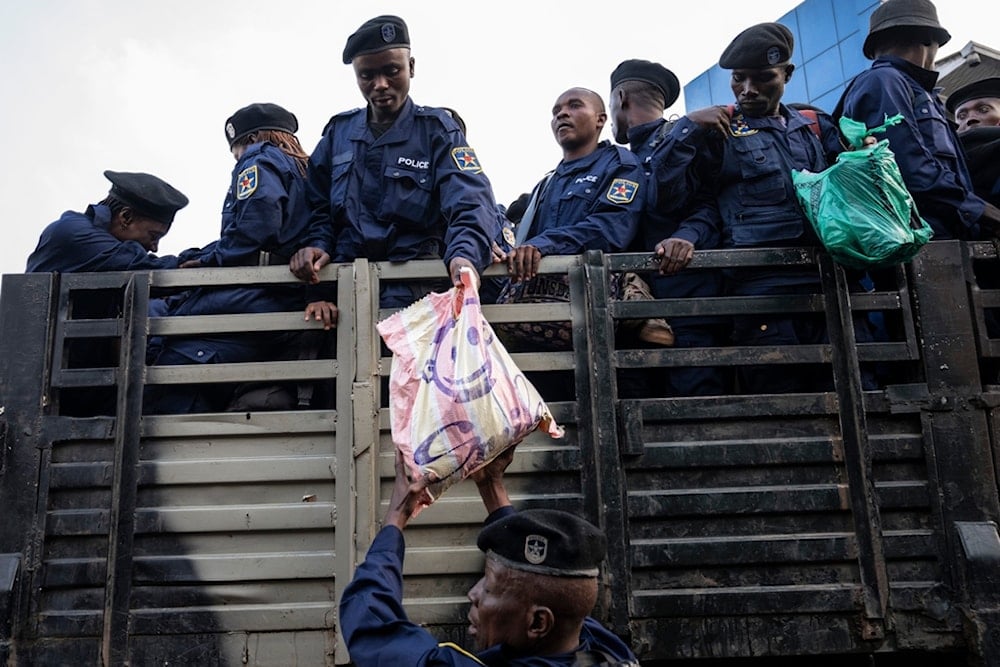DR Congo, M23 sign Doha framework for peace deal to end conflict
DR Congo and the Rwanda-backed M23 group have signed a framework agreement in Qatar after months of talks aimed at ending violence in eastern DRC.
-

Former members of the Armed Forces of the Democratic Republic of Congo (FARDC) and police officers who allegedly surrendered to M23 rebels arrive in Goma, Congo, on Sunday, February 23, 2025 (AP)
The Democratic Republic of the Congo and the M23 militant group signed a new framework agreement in Qatar on Saturday, renewing efforts to reach a political solution to the ongoing conflict in the east of the country.
The deal, officially titled the Doha Framework for a Comprehensive Peace Agreement, comes after several rounds of direct negotiations between DR Congo and the Rwanda-backed paramilitary group. The signing ceremony was attended by officials from both parties, as well as representatives from Qatar and the United States.
Qatar has hosted and facilitated the negotiations, alongside support from the US and the African Union, in a bid to end one of Africa’s most pressing armed conflicts.
Read more: Former DRC president rallies opposition in Kenya against DRC govt
Slow but strategic process toward truce
The newly signed agreement builds upon a previous ceasefire deal and initial framework signed in Doha in July. However, implementation has faced setbacks, with both sides accused of violating the terms of the earlier accord.
US Senior Advisor for Arab and African Affairs Massad Boulos said the Doha Framework outlines eight protocols, with full agreement still pending on six of them. He emphasized that while progress has been made, implementation will require time and patience.
“Yes, they were a little bit slow in the first few weeks,” Boulos told reporters following the signing. “Yes, people were expecting to see probably some immediate results on the ground, but this is a process... This is not a light switch that you just switch on and off.”
The first two protocols, involving prisoner exchanges and ceasefire monitoring, have seen slow but ongoing progress, according to US and Qatari officials.
Rwanda-backed militant activity in eastern DR Congo
The M23, a Rwanda-backed armed group, reignited its offensive in eastern DR Congo in late 2021. Since then, it has taken control of significant territory in the provinces bordering Rwanda and Uganda.
The armed group’s advance has severely destabilized the region, prompting concerns over a broader regional escalation. In early 2025, M23 fighters seized key provincial capitals, including Goma and Bukavu, in rapid offensives that shocked the Congolese government and displaced large numbers of civilians.
The fighting in eastern DR Congo has claimed thousands of lives and displaced hundreds of thousands more. Civilians continue to bear the brunt of the violence, with humanitarian organizations warning of deteriorating conditions in areas under M23 control.
The UN has raised alarms over the risk of further escalation, particularly amid growing tensions between DR Congo and Rwanda. Despite international calls for restraint, sporadic clashes and accusations of cross-border interference have continued.
Previous agreements and ongoing challenges
The July deal signed in Doha followed a separate peace agreement between the governments of DR Congo and Rwanda, brokered in Washington a month earlier. However, those agreements have yet to produce a sustained halt in hostilities.
In August, the two parties also signed an economic cooperation agreement as part of a US-backed de-escalation initiative.
The Doha Framework marks another attempt to bring stability to the region, but parties involved have stressed that much work remains.
The United States and Qatar, while acknowledging the importance of the new deal, have emphasized the need for sustained diplomatic engagement and political will from all parties.

 3 Min Read
3 Min Read









